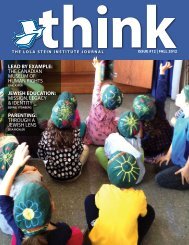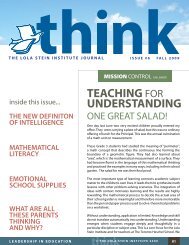Issue No. 13 - The Toronto Heschel School
Issue No. 13 - The Toronto Heschel School
Issue No. 13 - The Toronto Heschel School
You also want an ePaper? Increase the reach of your titles
YUMPU automatically turns print PDFs into web optimized ePapers that Google loves.
TEACHING TEACHING<br />
LOOK AT THE<br />
TEACHER:<br />
SEEK A<br />
MINDSET<br />
FOR<br />
GROWTH<br />
By Gail Baker<br />
Educational excellence of course demands a curriculum based on<br />
critical creative thinking and a teaching staff knowledgeable in<br />
the academic disciplines, but the magic of the very best classroom<br />
experience emerges from the personality of the teacher. After 17<br />
years as a school leader and educator, I can confidently say that<br />
classroom success depends on two things: how teachers see their<br />
students and how they see themselves. While healthy relationships<br />
between teachers and students are important, what matters most<br />
in the classroom is what is going on inside the teacher’s head. A<br />
teacher’s mindset, defined at http://oxforddictionaries.com as the<br />
“established set of values that someone holds,” will either create or<br />
obstruct a child’s opportunity to learn.<br />
Classroom success depends on how teachers see their<br />
students and how they see themselves.<br />
Great teachers notice their students’ personal qualities and correlate<br />
their teaching with these attributes so that their students succeed.<br />
In the Torah, Parshat Lekh Lekha describes how God keeps Avraham<br />
in mind and uses various pedagogical methods to keep him on<br />
track as he seeks the Promised Land. 1 God addresses Avraham’s<br />
confusions and misgivings with an understanding of the human<br />
condition that pushes the mission forward, even as Avraham<br />
questions God and doubts God’s motives: God encourages<br />
Avraham and promises to show him the land (Bershit 12:1–2); God<br />
requires Avraham to mark himself with circumcision as a physical<br />
reminder of the covenant (Bershit 17:11); and God inspires Avraham<br />
by sending angels to announce Sarah’s pregnancy to reassure him<br />
of his progeny (Bershit 17:21).<br />
As I looked through Lekh Lekha for multi-dimensional pedagogy,<br />
I noticed that not only do these biblical passages reveal God’s<br />
understanding of His student, Avraham, but they also indicate that<br />
God’s mindset as a teacher was one to model. <strong>The</strong> multiplicity of<br />
techniques God employed to bring Avraham along underscores<br />
God’s commitment to Avraham reaching Canaan, even while<br />
Avraham felt tested and confused en route.<br />
This reflection reminds me of the story of Helen Keller and Annie<br />
Sullivan. As you probably recall, Helen Keller became blind and deaf<br />
Malka Regan and Edna Sharet, Division Heads at <strong>The</strong> <strong>Toronto</strong> <strong>Heschel</strong> <strong>School</strong> attended the Harvard Graduate <strong>School</strong> of<br />
Education in July 2012. <strong>The</strong>ir summer course was entitled, “Improving <strong>School</strong>s, <strong>The</strong> Art of Leadership.”<br />
at the age of 18 months. Her communication with the entire world<br />
was cut off until Annie Sullivan came into her life as her teacher.<br />
What was it about Annie Sullivan that allowed this very challenging<br />
relationship to flourish and enabled Helen to succeed? 2<br />
Annie was a creative, tenacious, and courageous thinker. When<br />
she taught Helen, she found that many strategies didn’t work, yet<br />
she persisted and tried as many different tactics as were needed<br />
until Helen was successful. <strong>The</strong> famous breakthrough came when<br />
Annie held Helen’s hands under running water and, while doing<br />
so, spelled out each letter of the word “water” by touch on Helen’s<br />
hand. Finally, Helen understood that what she was feeling was<br />
what her teacher’s fingers were identifying with the word “water.”<br />
Annie then took Helen to explore her surroundings, spelling out<br />
everything by touch until Helen understood how words were<br />
connected to meaning.<br />
<strong>The</strong> Avraham and the Helen Keller stories exemplify how students<br />
benefit from teachers with growth mindsets. God kept faith with<br />
Avraham by using multi-sensory techniques to support him on the<br />
path to the Promised Land. Annie Sullivan had faith in Helen Keller<br />
and kept her on a path by understanding who Helen was and what<br />
she could do. As we know, Avraham did reach Canaan and Helen<br />
Keller achieved impressive international success as an author and<br />
lecturer.<br />
Good teachers see themselves as creative, capable of<br />
bringing in new ideas and not overly committed to past<br />
practices.<br />
Annie Sullivan was driven to teach those whom the world had<br />
forsaken because that fate was what she experienced early in her<br />
life. She, too, was visually impaired and had been abandoned at a<br />
young age. Fortunately, an inspector at her orphanage understood<br />
Annie’s gift and helped her to go to school. He was what psychologist<br />
and researcher Dr. Julius Segal called the “charismatic adult” in her<br />
life, someone from whom a child gathers strength. 3 Annie Sullivan,<br />
in turn, became Helen Keller’s “charismatic adult.”<br />
We want our teachers to be like Annie Sullivan. We want them to<br />
see their students as children who can grow and learn and whose<br />
achievements are not “fixed.” To assure ourselves of this, we have to<br />
look inside our teachers and ask them how they view themselves. Dr.<br />
Robert Brooks, a psychologist who researches and publishes on the<br />
subject of raising resilient children, writes that the differing mindsets,<br />
attitudes, and assumptions held by teachers about themselves and<br />
their students are the main determinants in how they will teach and<br />
what their expectations of their students will be. 4<br />
<strong>The</strong> mindset of our teachers is the real game in town.<br />
<strong>School</strong> leaders are responsible for securing teachers who have the right<br />
mindset for their schools. A good teacher will see himself as creative,<br />
as capable of bringing in new ideas and as not overly committed to<br />
past practices. She will be a critical thinker who can evaluate and<br />
be evaluated openly, and who collaborates well with peers, students,<br />
and parents. For instance, if staff decline professional development<br />
seeing themselves as sufficiently experienced professionals, this<br />
shows me a “fixed mindset.” And, as Dr. Carol Dweck says in her book<br />
Mindset, a teacher who has a fixed mindset about herself will likely<br />
feel the same about her students. 5<br />
This kind of teacher might say, “Suzy is naturally good at mathematics;<br />
reading is just not her strength,” or “Jamie is just not that bright. How<br />
can we expect him to think in an abstract way?” If you delve deep<br />
into this teacher’s psyche, chances are she too sees herself in fixed<br />
and particular ways.<br />
<strong>The</strong> teachers who see themselves as perpetual learners are<br />
those whose students succeed.<br />
Contrast a teacher set in his ways with the teacher who, just for fun,<br />
takes a class or seminar and gets excited about the learning. Teachers<br />
who see learning as a joy have a “growth mindset.” Whether they are<br />
20, 40, or 60 years old, the teachers who see themselves as perpetual<br />
learners are those whose students succeed.<br />
We who are the heads of our schools spend a great deal of time<br />
fashioning the right curriculum and building a supportive community<br />
to educate our children. We also have to look at our teachers<br />
thoughtfully and honestly and be thankful for their enthusiasm, their<br />
commitment, and their wisdom. <strong>The</strong> mindset of our teachers is the<br />
real game in town.<br />
1 Rabbi Nathan Laufer, <strong>The</strong> Genesis of Leadership: What the Bible Teaches Us about Vision, Values and<br />
Leading Change (Woodstock, VT: Jewish Lights Publishing, 2006), pp. 43, 45.<br />
2 See the video Teacher, included in Stephen R. Covey, <strong>The</strong> 8th Habit: From Effectiveness to Greatness<br />
(New York: Free Press, 2004).<br />
3 Julius Segal cited in Robert Brooks, “To Touch a Child’s Heart and Mind: <strong>The</strong> Mindset of the<br />
Effective Educator,” Center for Development and Learning, http://www.cdl.org/resource-library/<br />
articles/touch_child.php<br />
4 Robert Brooks, “To Touch a Child’s Heart and Mind.”<br />
5 Dr. Carol Dweck, Mindset: <strong>The</strong> New Psychology of Success (New York: Random House, 2006).<br />
Gail Baker, M.Ed., co-founded <strong>The</strong> <strong>Toronto</strong> <strong>Heschel</strong> <strong>School</strong> in 1996<br />
and has served as Head of the <strong>School</strong> since 2001. She is the Learning<br />
Community Director of <strong>The</strong> Lola Stein Institute, which she co-founded<br />
in 2003. Gail’s parallel commitment pursues the essential individuality<br />
in each child and the unique talent in each teacher. She presents<br />
lectures and seminars throughout <strong>No</strong>rth America and writes regularly<br />
for educational journals.<br />
Students at<br />
THE TORONTO<br />
HESCHEL SCHOOL<br />
EXCEL BECAUSE...<br />
We<br />
engage body & mind<br />
address the complexity of thinking<br />
combine the rich tradition of Jewish<br />
thought with global research in<br />
education<br />
model Harvard’s “Teaching for<br />
Understanding” for performance-based<br />
curriculum<br />
track students understanding by their<br />
ability to adapt to challenge<br />
draw on the arts to enhance cognitive<br />
flexibility and creativity<br />
employ talented motivated teachers for<br />
positive joyful classrooms<br />
maintain low teacher/student ratios to<br />
advance high academic achievement<br />
cultivate curiosity to drive learning<br />
through inquiry<br />
exemplify the Jewish way through<br />
ethics and practice<br />
build friendship & welcome children<br />
from the whole Jewish community<br />
collaborate at <strong>The</strong> <strong>Toronto</strong> <strong>Heschel</strong><br />
<strong>School</strong> Learning Centre where selected<br />
school leaders, senior educators<br />
& consultants assist teachers to<br />
resolve questions from pedagogical<br />
methodology to individual child needs<br />
equip graduates to excel academically<br />
& socially<br />
do everything under the sun to foster<br />
the love of learning<br />
We succeed and so do our students!<br />
Come see the difference a<br />
<strong>Toronto</strong> <strong>Heschel</strong> education can make!<br />
http://www.torontoheschel.org/<br />
06 think • issue <strong>13</strong> • SUMMER 20<strong>13</strong><br />
07






